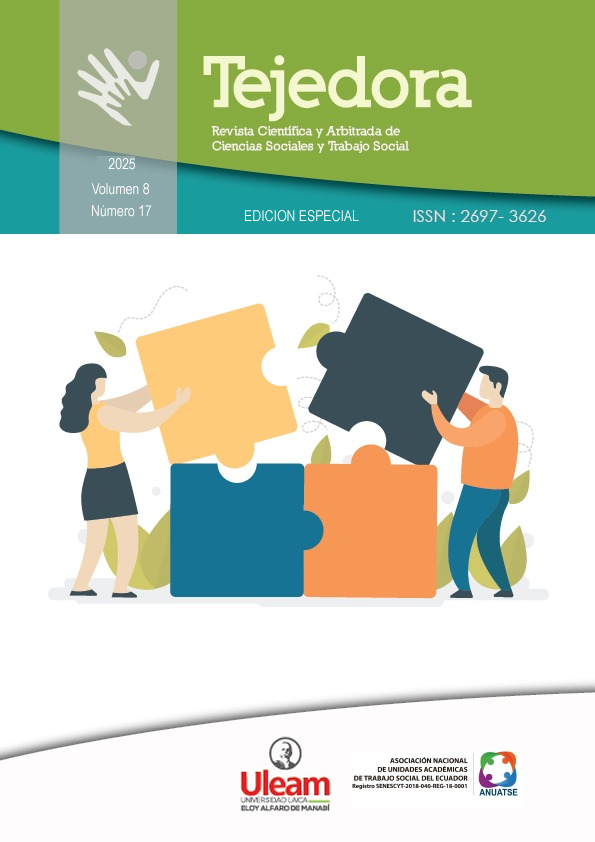EMOTIONAL INTELLIGENCE AND LEARNING IN UNIVERSITY STUDENTS OF PSYCHOPEDAGOGY, DISTANCE AND ONLINE
DOI:
https://doi.org/10.56124/tj.v8i19.015Keywords:
learning, emotional intelligence, psychopedagogyAbstract
This study analyzes the relationship between emotional intelligence (EI) and learning in university students enrolled in the Psychopedagogy program through distance and online education. EI is widely recognized as a determining factor in academic performance, as it influences emotional self-regulation, motivation, decision-making, interpersonal relationships, and adaptability to diverse educational settings. The objective of this research was to determine students’ EI levels and assess their relationship with academic performance in the Neuropedagogy course. A quantitative approach was adopted, using a non-experimental, descriptive, and correlational design, applied to an intentional sample of 22 third-semester students. Data were collected using the Bar-On Emotional Intelligence Test, adapted by Ugarriza and Pajares, while academic performance was measured through official course grades. The results indicated that students demonstrated medium to high levels of EI across the three core dimensions: attention to feelings, emotional clarity, and emotional repair. The average academic grade was high (M = 8.88; SD = 0.68), reflecting consistent performance among participants. A significant and positive correlation was identified between EI and academic achievement (ρ = 0.504; p = .017). It is concluded that emotional development plays a critical role in enhancing autonomous learning and academic engagement, particularly in virtual environments, where greater emotional management, self-discipline, and personal initiative are required for educational success.
Downloads
References
Gómez-Ramírez, M. A., & Hernández-Sánchez, J. (2018). La inteligencia emocional y su impacto en el aprendizaje a distancia de los estudiantes universitarios. Revista de Psicología y Educación, 13(1), 85-9 https://doi.org/10.33936/recus.v7i3.3470
Salovey, P., y Mayer, J. D. (1990). Inteligencia emocional. Imaginación, cognición y personalidad, 9(3), 185-211. https://doi.org/10.2190/DUGG-P24E-52WK-6CDG
Núñez, J. C., & Suárez, N. (2016). Inteligencia emocional en estudiantes universitarios a distancia y su relación con el rendimiento académico. Revista Electrónica de Investigación Educativa, 18(1), 45-56. https://doi.org/10.33789/enlace.20.2.99
Bar-On, R. (1997). Una definición amplia de inteligencia emocional-social según el modelo de Bar-On. Recuperado de https://www.reuvenbaron.com/37-2/
Cueva-Chata, M. S., Yana-Salluca, M., Vizcarra-Herles, N. E., Cutipa-Luque, R., Mendoza-Zuñiga, M., & Larico-Uchamaco, G. R.-U. (2024). Inteligencia emocional y rendimiento académico en una muestra de estudiantes universitarios: Un estudio correlacional. Salud, Ciencia y Tecnología, DOI: https://doi.org/10.56294/saludcyt20241010
Gusqui Bonilla y Galárraga Andrade (2023): Gusqui Bonilla, K. M., & Galárraga Andrade, A. S. (2023). Relación entre inteligencia emocional y el manejo del estrés académico en los estudiantes universitarios. REVISTA U-Mores, 2(2), 9–23. https://doi.org/10.35290/ru.v2n2.2023.873
Rodríguez, M. J., Torrijos, P., & Vaquero, M. (2020). Relación entre inteligencia emocional y rendimiento académico en adolescentes dentro de un centro educativo de excelencia en Sao Paulo. Universidad de Salamanca. Recuperado de https://gredos.usal.es/handle/10366/143606
Luna Conejo, B., & Luna Nemecio, J. (2022). El papel de la educación en línea para alcanzar sustentabilidad. Desafíos socio-ecológicos e inteligencia emocional. Sociedad & Tecnología, 5(2), 281. https://doi.org/10.51247/st.v5iS2.281
Cornejo, Y., Morán, D., & García, S. (2022). Análisis de la inteligencia emocional de los estudiantes universitarios de la Facultad de Enfermería de la Universidad Estatal de Milagro (2022). https://doi.org/xxx
Goleman, Daniel. Inteligencia emocional: La inteligencia emocional y su impacto en la vida personal y profesional (1995). https://books.google.com.ec/books?id=YuybDwAAQBAJ&lpg=PA1&hl=es&pg=PA1#v=onepage&q&f=false
Casal, J., & Mateu, E. (2003). Tipos de muestreo. Revista Española de Medicina Preventiva, 1, 3–7. Recuperado de https://www.researchgate.net/publication/303281625_Tipos_de_muestreo:contentReference[oaicite:5]{index=5}
Nathanson, L. (2005). La inteligencia emocional de los estudiantes y su relación con el rendimiento académico. Revista de Desarrollo de Estudiantes Universitarios, 46(2), 159–173.
Zeidner, M., Matthews, G. y Roberts, R. D. La ciencia de la inteligencia emocional: lo conocido y lo desconocido (2021). https://doi.org/10.1027/1016-9040.13.1.64
Cherniss, C. (2010). Inteligencia emocional: Hacia la clarificación de un concepto. Psicología Industrial y Organizacional, 3(2), 110-126 https://doi.org
/10.1111/j.1754-9434.2010.01231.x
Mayer, J. D., Salovey, P., y Caruso, D. R. (2004). Inteligencia emocional: Teoría, hallazgos e implicaciones. Psychological Inquiry, 15(3), 197–215. www.psychosocial-intervention.org
Hernández Sampieri, R., Fernández-Collado, C., & Baptista Lucio, P. (2014). Metodología de la investigación (6ª ed.). McGraw-Hill https://highered.mheducation.com/
Cueva-Chata, M. S., Yana-Salluca, M., Vizcarra-Herles, N. E., Cutipa-Luque, R., Mendoza-Zuñiga, M., & Larico-Uchamaco, G. R.-U. (2024). Inteligencia emocional y rendimiento académico en una muestra de estudiantes universitarios: Un estudio correlacional. Salud, Ciencia y Tecnología, 4, 1010. https://doi.org/10.56294/saludcyt20241010
Published
How to Cite
Issue
Section
License
Copyright (c) 2025 Revista Científica y Arbitrada de Ciencias Sociales y Trabajo Social: Tejedora. ISSN: 2697-3626

This work is licensed under a Creative Commons Attribution-NonCommercial-ShareAlike 4.0 International License.






















